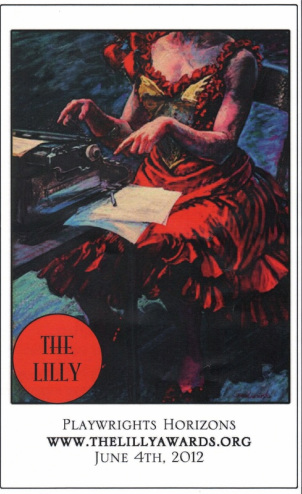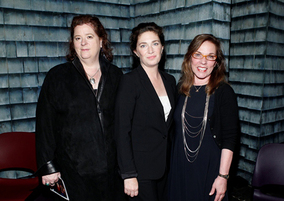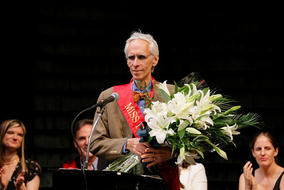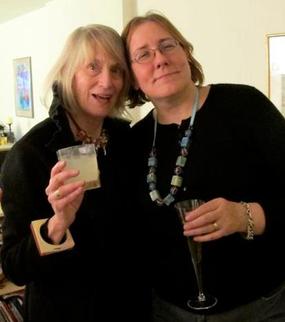
What I mean is that there were I was invited to two awards ceremonies. One was the Lammies, the Lambda Literary Awards, the annual celebration of the best literature in the GLBT community. I was a judge in one category, a nominee in another. But in the same city, at the same time, there were also the Lilly Awards: the third annual celebration of women playwrights, by women playwrights, that honors our own, and the people who love us.
I am a woman, a writer, a playwright, a queer person (in so many ways it’s multi-dimensional). And it’s become clear to me over the years that such distinctions are specious and no one has the right to ask you to define yourself or put those categories in an order. You might as well say: I’m a little finger. I’m a pancreas. It’s impossible. They were honoring one of the people I love most in the world at the Lilly Awards, so the decision was easy: Playwrights Horizons, 42nd St., with bells on, for Tina Howe.

Tim Sanford, Artistic Director of Playwrights Horizons, resplendent in his “Miss Lilly” sash, an honor accorded to brothers who are also sisters, remarked that he is SO glad that The Lilly Awards are now a “thing.” He welcomed us, and introduced the divine Estelle Parsons to give the Invocation. Ms. Parsons spoke of her childhood (in the late ‘30s), discovering her voice in community theater, run as so many were, by a woman with intelligence and taste, who wanted more than the role prescribed to her by society at the time. Parsons, who would be honored later, finished with a rousing “Onward!”
Then the founders: playwrights Theresa Rebeck, Marsha Norman and Julia Jordan welcomed us, and reminded us that the reason they’d called us all together again was that just three years ago, they’d watched as awards season left the station with no women on board…and they’d decided to throw their own party, and created the Committee for the Recognition of Outstanding Women in Theater. As my shrink says to me each time I leave him: “Remember, Kathleen, living well really IS the best revenge.”
There was a delicious tension in the air as the women spoke of the need for self-recognition and celebration. The adjective “angry” was batted around, like a balloon, or a badge of honor. I’ve found that the word “angry,” depending on who is applying it, is often used as a weapon against someone who has a legitimate concern…or by someone who is frightened of what’s being said or asked.

Joyce Ketay led off presenting the first Lilly, for directing to Diane Paulus, whose long resume includes the Broadway productions of “Porgy & Bess” and “Hair,” and who is the artistic director of A.R.T. Paulus accepted with alacrity (because she had to go off to a fundraiser for her own theater) and invited the women present to send her their plays, bring her projects they want to create or direct.
David Ives then came onstage to present the acting award to the divine (an actual goddess in his play, “Venus in Fur,”) Nina Arianda. The multi-tasking Arianda, who was scheduled to perform for the President in a few hours, also took the time to speak movingly of her parents, especially her mother, as well as the writer who created the character she brought to life. And she also stuck around to present this year’s “Miss Lilly” award to Ives: complete with red silk sash, bouquet of flowers, and tiara, which Ives wore for the rest of the evening. Because that’s the kind of guy who is worthy of the title “Miss Lilly.”
Tonya Pinkins then came to the stage to present a writing Lilly to Katori Hall, whose “The Mountaintop” had a successful run on Broadway last season (after its Olivier Award-winning run in London), and whose “Hurt Village” (starring Pinkins) was also seen at the Signature. Hall showed both gratitude and vigilance, reminding the audience: “We still have so much work to do.”
Director Trip Cullman presented the next writing award to Leslye Headland, who is about to make her directorial debut with the film of her play, “Bachelorette.” (and also wrote this season’s “Assistance.”) Headland talked about once having had a fear of writing, and urged everyone to get over it…and she spoke movingly of Wendy Wasserstein as a mentor and friend.
Acclaimed set designer Louisa Thompson presented the next award to Sarah Benson, artistic director of Soho Rep, whose award-winning work has included a production of Sarah Kane’s “Blasted” and new works by such wonderful playwrights as Annie Baker and Young Jean Lee. Benson was giving birth (pretty much) last year when she was first offered the award, and came back this year to talk about both artistry and motherhood.
It was a theme mentioned by several of the women presenting and receiving awards: how they had been told that women “stepped away” when they had children, and couldn’t keep up their artistic careers…and then they told stories about how they’d done it (with the support of other artists, and also by multitasking such functions as tech rehearsals and breastfeeding.
Marsha Norman presented the next award to Heidi Ettinger, whose many designs have shaped and enhanced Broadway plays, musicals, national tours, and operas. She designed the set for Norman’s “ ‘Night Mother,” and “The Secret Garden,” as well as the original production of Tina Howe’s “Painting Churches,” among many others.
The next award was for musical acting, and went to Christin Milloti, and was presented to her by her co-star Lucas Pappaelias, who brought his guitar to the stage and serenaded her with a song of his own composition, which cited her various credits and had a chorus of “I get to party with Christin Milloti.” Christin broke the “f-word” barrier (and apologized profusely to her parents), and while it got used a time or two more, no one else really worked blue.

As for me, I can’t begin to find words to say how much Tina has meant to me as a teacher and a friend. She’s someone who has touched so many lives…one by one…that there are generations of us whose hopes and views have been shaped by her kindness and wisdom.
And Tina accepted the award in her inimitable fashion, citing her traumas as a schoolgirl, and her awakening to Ionesco, and how she put the “white gloves” on as a playwright, in order to be heard, while keeping her surreal, sublime vision close and visible to those who look.
And Estelle Parsons was brought back to the podium for her award by Frances McDormand, who also knows a thing or two about making a playwright’s work sing.
Then we all levitated and went across the street to the West Bank Café, where everyone mingled and consumed potent potables, and I’m so glad that the Lillies are a “thing” and not an institution, where we can repair to the bar after, and talk and get an eyeful of each other and tell stories, and pass the pizza and realize: we got it going on. And say “thank you.” To the women who’ve come this far, and the ones who are making it happen now, and pushing the ones after us into the future.
 RSS Feed
RSS Feed
